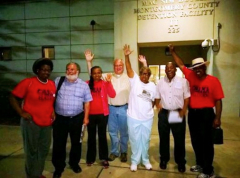 Trial held at Montgomery County Courthouse – ALL SEVEN ACQUITTED
Trial held at Montgomery County Courthouse – ALL SEVEN ACQUITTED
The seven Alabamians arrested for singing and praying in the State Capitol as an act of faith in support of health care and Medicaid expansion were found not guilty following their trial in Montgomery County District Court on Tuesday. The purpose of their moral stand remains to persuade Gov. Robert Bentley to extend Medicaid coverage and save the lives of Alabamians.
In his oral ruling from the bench, Judge W. Troy Massey said that this case follows in the long history and tradition of Americans risking jail to stand up for principles greater than themselves. He cited Americans in 1773, who trespassed onto three ships and destroyed $1 million worth of tea (in 1773 dollars) by dumping it into the Boston Harbor. Today we know that as the Boston Tea Party. He cited Rosa Parks, who refused to give up her seat on a Montgomery bus in 1955 in protest of segregation, which led to the Montgomery Bus Boycott and advances in desegregation of public transportation. He cited protests in Selma in 1965, which led to the Voting Rights Act. He cited Dr. Martin Luther King, Jr.’s lifetime of nonviolent protests and others.
The Judge also referenced how peaceful the crowd was in the courtroom throughout the hours of trial proceedings. Several Capitol Police Officers who were witnesses at trial also detailed how peaceful and prayerful the defendants’ demeanors were during their abbreviated prayer vigil at the State Capitol on August 28th. Not only was no damage done to property; no voices were even raised.
One assertion by the prosecution’s witnesses, which came out in court and surprised the defense and others in the courtroom, was that state policy denies all Alabamians any right to peacefully protest, even silently, in the State Capitol at all times – 24 hours a day, seven days a week, 365 days a year – not just after 5 p.m. on weekdays.
The Alabama statute on trespass provides that if a person has an honest belief they have a right to be in place, such as the State Capitol, sometimes called “the People’s House”, that person cannot be convicted of criminal trespass. Civil trespass is the recourse available under such circumstances. The Judge cited the defense of honest belief to the trespass charges as “compelling.” He also said the justification defense of necessity, which the defense raised, was “compelling.” Evidence demonstrated that, on the average, three people die every two days in Alabama because of the failure to extend Medicaid. The seven defendants were arrested while they were trying to save hundreds of lives each year in Alabama alone.
The seven citizens arrested on August 28, 2014, for peacefully protesting by attempting to hold 24-hour, non-violent vigil in the Alabama State Capitol in Montgomery and who were found not guilty of the charges in Montgomery County District Court include:
• John Zippert, Newspaper Publisher and member of the Greene County Hospital and Nursing Home Board
• Augustus (Gus) Townes, retired State Employee and Community Leader
• Faya Rose Toure’, Civil Rights Attorney and Activist
• Alecha Irby, College Student and Community Worker
• Reverend Fred Hammond, Tuscaloosa Pastor and Community Leader
• Reverend Kenneth Glasgow, Dothan Pastor and Director of The Ordinary Peoples Society (TOPS)
• Annie Pearl Avery, Longtime Grassroots Warrior
Quotes from the individual defendants acquitted:
Faya Rose Toure’: “I am so proud that justice reigned this day. Too often justice is not done in our courts, and it is great when justice prevails. We will keep fighting to protect the lives and the health of Alabamians.
Reverend Fred Hammond: “This is a matter of life and death, and hope for life triumphed this day.”
John Zippert: “We were just trying to do right, and the Judge recognized that.”
Reverend Kenneth Glasgow: “This is the first time I’ve been arrested for doing right, and this is the first time I’ve been found innocent. It’s good to do right.”
Annie Pearl Avery: “When you stand up for right, right will prevail. I was on the Edmund Pettus Bridge during Bloody Sunday in 1965, and I am still standing up for right today.”
Alecha Irby: “I am proud that as a young person I stood up, and I am proud that justice was done. More young people need to stand.”



